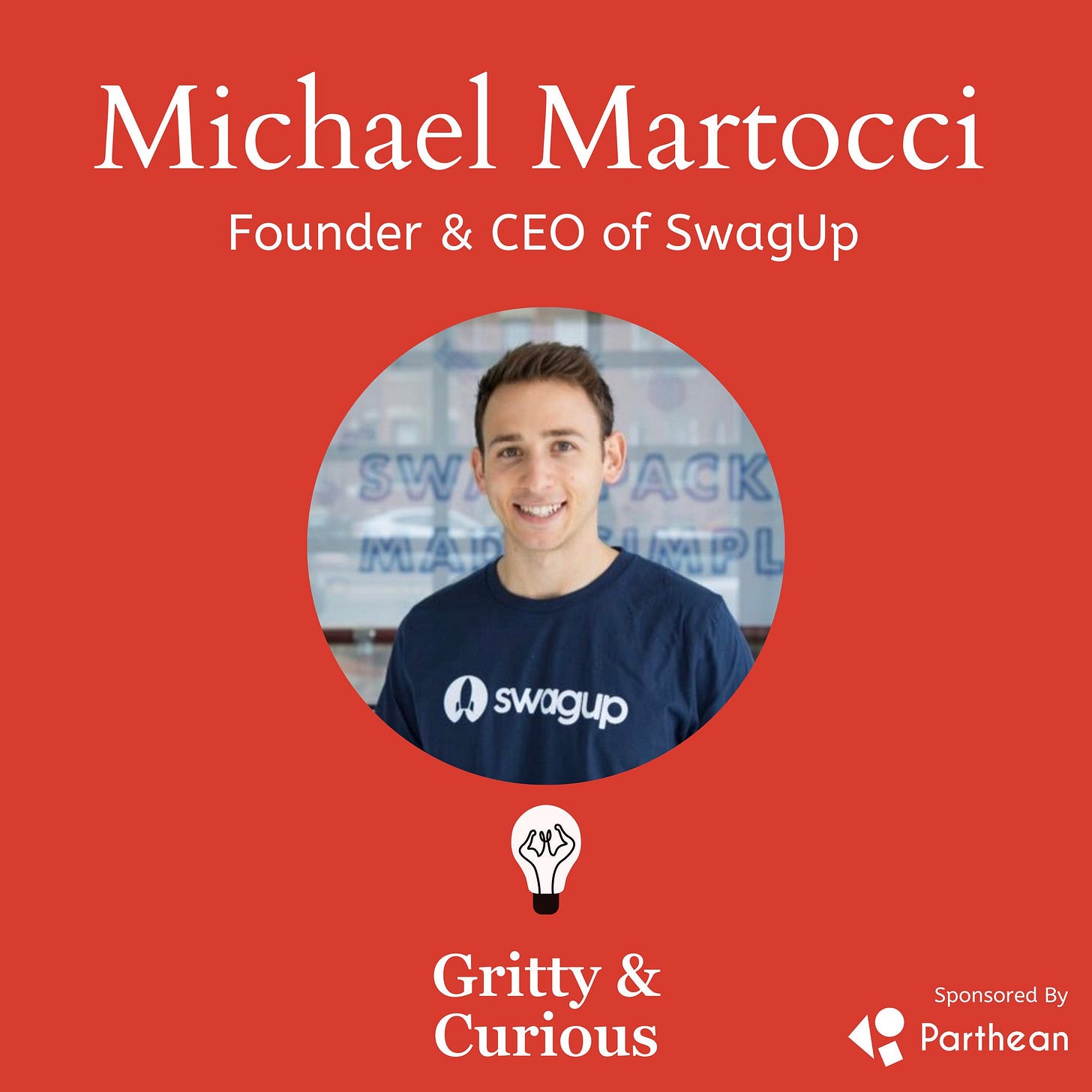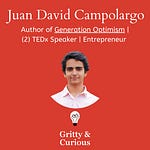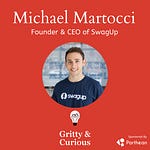This past week, we’ve gained 2 new subscribers to the newsletter. Welcome to the Gritty & Curious Family! If you’re reading this but haven’t subscribed or know friends who would enjoy this newsletter, be sure to subscribe below and share it with your friends.
Hi Gritty & Curious Family,
Happy Monday! If you’ve checked Austin and my socials recently, you probably would have noticed a 💡 besides our name.
The reason is because… We’re rebranding.

Do you like it? Let us know what you think @GrittyCurious
Okay, onto the podcast!
This week, we had an amazing conversation with the one and only Mike Martocci, CEO and Founder of SwagUp — a company focused on providing quality swag to companies. In just 36 months, Michael was able to bootstrap his company from his mom’s house to 1300 customers, 65 employees, 8 figure in sales with 0 VC funding. That’s quite an amazing feat.
So how did he do it?
In this episode, Austin and Mike Martocci talk about…
Dropping out of College
What it means to be Entrepreneurial
Advice for people starting their jobs/creating opportunity during the Pandemic
and more!
Take a listen below or in the audio player above!


As always, we have provided Podcast Highlights below with the key takeaways from the podcast:

Podcast Highlights
What does it mean to be entrepreneurial?
Being entrepreneurial means to constantly be in beta- always experimenting and iterating to figure out what works and doesn't —instead of being in the mindset of "what could go wrong".
Growing up Mike has exemplified the entrepreneurial mindset — he's sold lemonade, yogurt, bundled tissue packages, baseball cards, shoveled driveways.
Key Quote: "The core tenant of being entrepreneurial is just doing things and reacting after it happens verses like overthinking it"
On Dropping out of College after Two Years
The Downside of University: There are a lot of aspects in the current education system which is unnecessary. If a person is interested in entrepreneurship, there is a lot more value in gaining exposure by starting a business and watching Shark Tank than taking a lab science class.
The Upside of University: If you can afford it, the University experience is very helpful in gaining new experiences and the transition between high school and adulthood independence.
Mike felt he experienced all the necessary components of university 2.5 years in and as a result dropped-out to start his own business.
What is the future of education?
The degree you receive after graduation is becoming increasingly less valuable. The use-case of education is shifting from certification/qualification to expertise. Companies care more about whether you can do a job as opposed to you having a degree that qualifies you to perform certain tasks and duties.
Lambda School is a prime example of the shift towards more vocational-based education for software engineering jobs. Instead of giving you a degree in computer science, they are focused on providing each student with the skills needed to land a job in software engineering. (They take a cut of your future salary for a fixed duration so they can only make money after you land a job.)
The internet has provided a way for almost anyone to learn about anything. If you are gritty and curious, you can self-select the information you need to learn. But there could be a business for curating a structured curriculum for those who want a more defined-path in education
In the traditional education system, we learn a lot of just-in-case information but the future of education will focus a lot more on just-in-time information -- knowledge that is prevalent for the current task at hand.
How do you replicate the college experience for remote learning?
This problem is the same problem as building culture in companies that are fully remote— and the solution for remote companies currently are bi-annual/annual retreats.
Building villages/communities where college students reside and hangout is another alternative to foster the "college experience" in an environment of online education.
What are the roles of offices for businesses post-COVID19?
In the past, the technology was not there to work remotely but now that it has, we will see a large transition to more fully remote businesses.
At the same time, there is no denying how important of a role physical offices plays around communication and building camaraderie. But with the advent of remote work, physical offices can be allocated more efficiently.
A future model of what offices might be is shared workspaces or "corporate clubhouses" where two-to-three different companies will have a designated space to hangout/bring in clients but are always free to work remotely.
On collaboration, socialization and culture at SwagUp during the COVID-19 pandemic?
A misconception of culture in a company is the benefits you receive —free swag, free food, retreats, parties. Instead, the important aspects of culture are how transparent a company is with information, the value on meritocracy, the rewards of doing great work, etc.
At SwagUp, the culture is fostered through transparency -- weekly company-wide meeting which goes through financials, potential hires, etc-- and creating valuable and meaningful work to give people purpose.
Advice on people starting a job right now
Be valuable to a company from day one and try to help solve problems.
Be Gritty and Curious— Mike always looks for people who are like this when he's hiring. (e.g. have you started something on the side? What are you really interested in that you've delved deeper into?)
Get in touch with people you admire at the company that are ahead of you and ask them a lot of questions -- people love to share their knowledge and will most likely answer you. This will help build a connection as well.
Key Quote: "Be as valuable as possible to the company right away. There's always room for people to move up who are problem solvers and who are gritty and curious"
Advice on people who have lost their job/internship opportunity due to the pandemic
Don't worry about the "gap" in your resume. It's very understandable that you are out of a job, given that 36 million people are unemployed right now.
But there are two things you can do in this position:
1) Start something on your own and constantly learn. Take advantage of the free time to build yourself up and creating something worth sharing in the future.
2) Work at a company for free. If you are able to prove yourself to be valuable, chances are they will hire you when given the opportunity. The hardest thing is getting into the door.
Key Quote: "The hardest thing is the initial friction of giving you money or giving you the position. But if you work for free and start to show your value even literally in a week or two people will understand we can't afford to lose this person"
On Building a Community and gaining Influence:
We can learn a lot from social media influencers. The best social media influencers pump out valuable content every single day.
Getting the initial traction is tough, but once you have that, it's just momentum that builds growth. This is why to start off you need to capitalize on high leverage opportunities (e.g. working for free).
Key Quote: "The greatest way to build any platform is to provide more value than you ask for in return"
On Why Twitter is so Powerful
"There's no other platform you get such direct access to the smartest people in the world"
To use Twitter properly, you need to curate your follower list so that you follow interesting people who are signaling interesting ideas and eliminate all the noise.
Mike Martucci's recommended people to follow:
@naval - Naval Ravikant
@RMB - Rob Bailey
@benthompson - Ben Thompson
On Content Strategy and Best Platform for Sharing Message
Don't force out content just to stick to a schedule. If you can, you should but being consistently bad is still bad.
Instead, focus on writing evergreen, valuable content as frequently as possible as opposed to just writing for the sake of writing.
LinkedIn is the best platform for getting recognized because of how their algorithm works. If someone likes something on LinkedIn, it gets propagated throughout their entire network.
Advice on Overcoming Failure
People are too caught up on failure. Everyone fails every day, week, month, and year.
It's more important to optimize for failure. Instead of worrying for failure, put everything out there. Speed and rapid iteration is more important than any failure.
Key Quotes: "100 out of the 120 are probably going to fail but you'll get the 20 and you'll move quickly", "If you can maintain optimism for as long as possible, you're 80% of the way there to doing anything valuable"
On Most Impactful Books
Purple Cow by Seth Godin
Positioning: The Battle for Your Mind by Al Ries and Jack Trout
If you want a copy of these notes in Notion, click here.
Thanks for reading! We’ll see you next week and as always…
Stay 💪 & 💡,
Austin & Andy













Share this post